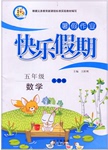题目内容
The river, _______ the bank are covered with trees, is very long.
A. whose B. which C. of which D. which of
C
解析:
名词或代词+关系代词whom / which可以引导非限定性定语从句。表示部分与整体的关系,作用相当于whose+名词,of which the bank =the bank of which = whose bank, 因此答案为C。

 一诺书业暑假作业快乐假期云南美术出版社系列答案
一诺书业暑假作业快乐假期云南美术出版社系列答案Dick was born in a poor family. His father had a small boat and went fishing in the morning and sold the fish in the market in the afternoon. Then he bought some food for his family. When winter came, they were often hungry. One morning the hungry man fell into the river and wasn’t found. Dick’s mother left her three-year-old son without saying good-bye. His aunt had to look after him.
Twenty years passed. Dick became a tall, strong man. He found work on a farm. He worked hard and wanted to get more money. He often went to see his aunt with some nice presents. The woman was very happy but one day she died in a traffic accident. The young man was very sad. After he buried her, he decided to buy a beautiful tombstone(墓碑)for her. He went to town and came in a shop, but all the tombstones were too expensive. He asked, “Do you sell an old tombstone, sir?” “Yes, we do, sir, ” answered the shopkeeper. “Is it as expensive as the new one?”
“No, it’s much cheaper,” said the man. “But another name was engraved (刻) on it.” “It doesn’t matter, ” said Dick. “My aunt couldn’t read.”
1. If , the family members were hungry.
|
A.Dick’s father could catch no fish in winter |
|
B.Dick’s father had a boat in winter |
|
C.Dick’s father had to look after him in winter |
|
D.no food was sold in winter |
2.Dick wanted to get more money to .
|
A.marry a wife |
B.give his aunt nice presents |
|
C.buy a farm |
D.build a house |
3.Dick often went to see his aunt because .
|
A.she felt lonely |
B.she was often ill |
|
C.she had no children |
D.with her help he grew up |
4.Dick wanted to buy an old tombstone because .
|
A.he didn’t had enough money to buy a new one |
|
B.his aunt couldn’t read whose name was engraved |
|
C.his aunt wasn’t going to mind it |
|
D.nobody knew what his aunt’s name was |
One night I went to Himeji, a city not far from Kobe. As I walked with my family along the river I saw a __20__. It was a young man who looked just like me. He was wearing a cap and smiling. Around his neck was a leather strap (皮带)and in his hands was a saxophone. He was __21___ the saxophone to his __22__ and just about to play. My family walked on up the river towards the castle __23__ I stayed there by the statue, __24__ of playing a saxophone on TV.
Two weeks later it was my birthday. Imagine my __25___ when I opened my present from my parents and found that it was a __26__! I put it to my lips to play, but it wouldn’t make a sound. Then Dad told me to read the __27___ book to find out what to do. After about 15 minutes the saxophone was ready to play. I __28__hard but I couldn’t get the saxophone to play. I was almost __29___ when suddenly the saxophone made the most beautiful sound – loud and clear like I __30__ the music of the man by the river in Kobe.
|
1. |
A. car |
B. bus |
C. train |
D. motorcycle |
|
2. |
A. bank |
B. castle |
C. mountain |
D. river |
|
3. |
A. closed |
B. open |
C. broken |
D. clear |
|
4. |
A. low |
B. lonely |
C. loud |
D. deep |
|
5. |
A. man |
B. statue |
C. photo |
D. picture |
|
6. |
A. playing |
B. picking |
C. lifting |
D. rising |
|
7. |
A. hands |
B. ears |
C. eyes |
D. lips |
|
8. |
A. though |
B. but |
C. so |
D. or |
|
9. |
A. dreaming |
B. pretending |
C. admiring |
D. observing |
|
10. |
A. anger |
B. regret |
C. sickness |
D. joy |
|
11. |
A. guitar |
B. drum |
C. saxophone |
D. violin |
|
12. |
A. music |
B. exercise |
C. instruction |
D. note |
|
13. |
A. blew |
B. flew |
C. shook |
D. beat |
|
14. |
A. reading |
B. crying |
C. talking |
D. asking |
|
15. |
A. made |
B. heard |
C. played |
D. imagined |

